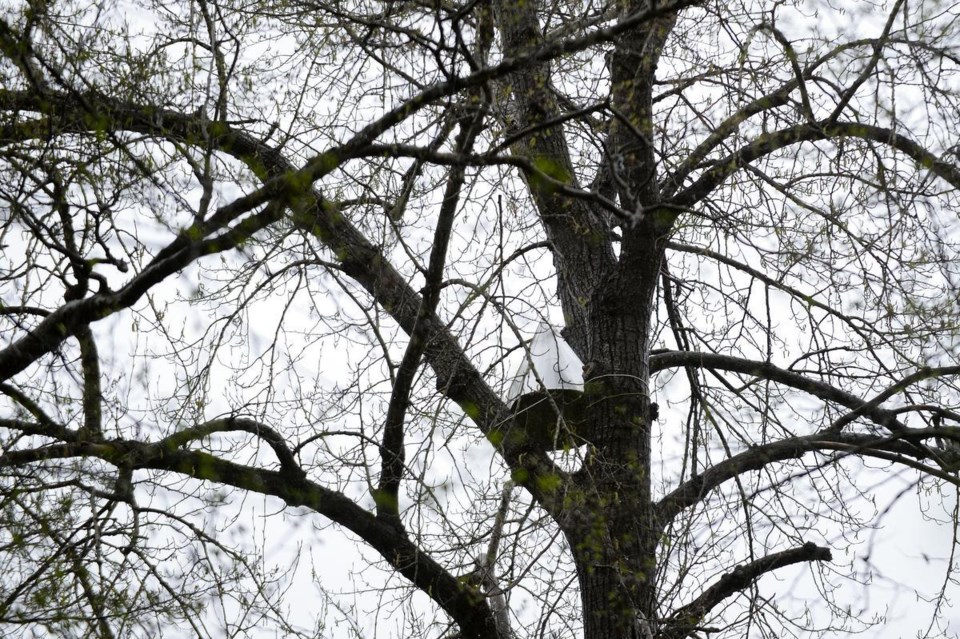A plan to cover the nest housing two Bald Eagles and their eaglets has stirred disapproval among residents in one Vancouver community.
The active eagles' nest is located on the UBC campus across the street from a building development site, at the intersection of Ross Drive and Birney Avenue, and has been there for many years.
Despite the pair of eagles having their first successful mating season in 2022, since first occupying the nest in 2017, the UBC Properties Trust and Polygon Homes plan to "cone" the nest to continue building more housing.
"Coning" refers to putting a metal cone over a nest to prevent access to it.
One UBC resident's petition to prevent the coning of the nest amassed over 12,500 signatures in the first four days and, as of August 30, has now almost 17,000 signatures.
"We are not opposing housing development within the general area ... we just believe that the 160-metre area around the nest should be protected, in accordance with B.C. legislation," reads the petition.
Recently recovered endangered species
Bald Eagles have only recently recovered from being an endangered species due to habitat loss (Bald Eagles live near the shoreline at the top of tall trees, which have been sacrificed for human development), and this year has seen low nest success rates partially due to the avian bird flu.
The eagle pair who have been using the nest since at least 2017 - though local knowledge keepers say it's been for much longer - had their first successful offspring in 2022 despite previous mating attempts.
"Loud building work was carried out between 2017 and 2021, much closer to the nest than the 160-metre 'sound buffer' recommended by the B.C. government," notes the petition, adding that 2022 was "the first year since 2017 that there was no nearby building work," and the eagles have now "successfully bred and raised eaglets."
"Despite this, UBC Properties Trust and Polygon Homes now want to cone the nest this fall in order to press on with more building work in the area," explains the petition.
Artificial nest
UBC Properties Trust and Polygon Homes have brought in David Hancock, co-founder of the Hancock Wildlife Foundation, to build an artificial nest nearby outside of the sound buffer.
The artificial nest is constructed halfway up a tree with restricted access, unlike typical Bald Eagle nests which are built at the top of trees with unrestricted access and sight lines. Though there is a chance that the eagles will migrate to the new nest, there is also a chance that they won't.
“It is really hard to know what effects coning the existing nest will have," anthropologist and professor Charles Menzies tells V.I.A. "There is very little published literature documenting the technique. The one publicly reported coning of a nest on the Trans Mountain pipeline route in Burnaby seems to have worked at the time, but we don’t know how effective it is in the long term.”
Bald Eagle nests are protected under section 34 of the BC Wildlife Act which makes it an offence to possess, take, injure, molest or destroy a bird or its egg, or the nest of an eagle (as well as other birds) whether it is occupied by a bird/its egg or not.
"In order to cone the nest, the Trust / Polygon will need to apply to the Ministry of Forests for a permit to get around the legislation protecting Bald Eagle nests," the petition explains further.
"We hope that support for this petition can demonstrate that this permit should not be granted," it adds.
The petition
Claire England, the resident who started the petition, told V.I.A. on Friday (Aug. 26) that she has brought forward the petition to UBC Properties Trust and Polygon Homes "to ask that they abandon their plans in light of the strength of public feeling." So far, she hasn't had any response.
Menzies weighed in on the likelihood of development plans changing or stopping due to public opposition.
“If the developer thinks they have sufficient public and government support to continue they will continue without changing their development plans," he tells VIA in an email. "If they think it might affect their bottom line then I suspect they will make changes. Whether development happens at all may well depend more on current interest rates and the health of the housing market than [based] on concerns over protecting the eagles’ nest.”
V.I.A reached out to UBC Properties Trust and Polygon Homes for comment but have yet to receive a response.
England plans on taking the petition to others involved too.
"Our plan was to do the petition first, gauge the level of public support, and then go to the [Minister of Forests]. Because there wasn't going to be much point [if] we had 50 signatures. Now that it's clear that there is a lot of public opposition, our next step is to contact the Minister and ask them to reject the permit for the coning application," England tells V.I.A by phone.
She adds that they're trying to move quickly because although the coning process is said to start in the fall, it could begin as early as September.
"These eagles have put up with the noise of a lot of construction work since 2017," says England. "It doesn't seem right for a university, in particular one that's supposed to have its sustainability goals and a sustainability agenda, to disrupt an ecosystem in this way."




